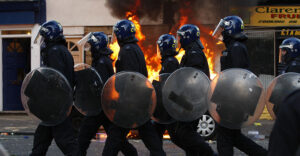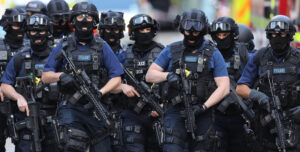In the early hours of a recent Sunday morning, not far from my home in a cosy south London suburb, a fight broke out between a large group of males. Eyewitnesses say the assailants were armed with knives, and described a “war zone” outside their windows on the Wandsworth Road. What followed was all too familiar: machete-wielding youths running wild between the traffic; choppers whirring overhead; police cordons; forensic tents. In this latest episode of baffling violence, three young men were stabbed: two were hospitalised; the third lay dead in the street.
The incident was not unusual. Last year, 244 people were murdered with knives in Britain, an 8% jump from 2022. That’s shadowed by countless private tragedies. In August, two 12-year-old boys were convicted of killing Shawn Seesahai with a machete at a park in Wolverhampton. The 19 year old was struck with such force that the blade almost passed through his body.
Days earlier, 15-year-old Daejaun Campbell was stabbed to death with a zombie knife in the London suburb of Woolwich. Turning on the news recently, I saw Dr Olumide Wole-Madariola, whose son Malcolm was stabbed to death with a blade outside Clapham South tube station in November 2018. I remember the incident well: I passed the taped-up crime scene a few hours after the tragedy.
Our country, in short, is suffering a plague, an orgy, of knife crime. Yet if the violence feels pointless, a howl of bloodstained nihilism, stabbings in Britain are far from incomprehensible. From shuttered police stations to culture to health, our current emergency has causes. If our political class has the will or ability to do anything about them are different questions altogether.
When locals heard the chaos on Sunday morning — the revving cars, the screaming men — the police would have responded to their 999 calls almost instantly. Lavender Hill Police Station is on the very same Wandsworth Road where the violence kicked off, and thus minutes away from the crime scene.
Somehow, Lavender Hill nick has managed to survive a cull that’s seen the number of police stations in the capital plummet from 160 in 2008 to just 36 today, despite covering a city of nine million people. You don’t need a calculator to figure out that something doesn’t add up here. If the powers-that-be get their way, moreover, the plan is to whittle this down to just 32 stations, or one per London borough. Across England, more than two-thirds of stations have closed in recent years.
Talk to any copper of the old school and they’ll tell you that the closure of police stations, and the loss of bobbies on the beat, has had a major impact on local intelligence gathering and police visibility. The inexperience of young officers hardly helps either: as one officer complained to me recently, new recruits can’t navigate without the assistance of Google. Bobbies, like black cab drivers, once did this all from memory.
Dovetail all this with the numbers, and you have a plausible argument that fewer police stations means more crime. According to the Office for National Statistics, after all, the year to December 2023 witnessed almost 50,000 violent and sexual offences involving a knife or sharp instrument nationwide. That’s a rise of nearly 14,000 from March 2011, even as stabbings have soared in London too. While Sadiq Khan is habitually blamed here, recall too that Boris Johnson ran the capital before him, and that both mayors were anyway hamstrung by years of Whitehall austerity.
Yet if the mass closure of police stations over the last 15 years clearly hasn’t improved the crime stats, we also shouldn’t exaggerate. For one thing, it’s easy to romanticise policing as something out of Dixon of Dock Green when, for decades, many in Britain saw the police as an army of occupation, their stations were fortresses, and the Met was a “force” not a “service”. As one veteran cop told me: “I’m not there to ‘serve’ the public, I’m there to enforce the law and fucking nick bad guys.”
And if you examine the numbers in detail, our straightforward tale of austerity and cuts becomes rather more complex. As the largest police force in the country, the Met currently employs 33,631 officers — nearly a quarter of all coppers in England and Wales — and gobbles up 25% of the nation’s police budget. As senior figures such as Mike Cunningham, former chief executive of the College of Policing, have pointed out, boots on the ground aren’t a panacea here. Quite aside from the fact that the law and order budget for England and Wales actually rose last year, jumping by more than £550 million, the nature of crime is changing. From targeting violent criminals ahead of large-scale events like the Notting Hill Carnival, to diverting social spending to vulnerable neighbourhoods, policing in modern Britain is about far more than foot patrols.
More to the point, I think focusing purely on numbers misdiagnoses a problem that’s multigenerational and systemic. Let me put it differently. What both sides of the knife debate fail to understand, whether that’s the Tory press or liberal anti-violence activists, is that carrying a knife has become so much more than the cliched “fashion accessory” or even misguided means of self-defence: it’s morphed into a weapon of urban destruction.
I know because I’ve been there, done that, made noise, and yet seen nothing change. Knife culture, after all, is part of a lore that stretches back decades: through subcultures and ethnic groups, as well as via gangland brawls and “lone wolf” terrorism. And yet, I’m sad to say, our old friend political correctness dictates that those worst affected by the fear, stigma and brutal reality of knife crime are often too afraid to speak in the media about it. Why? Because being accused of “airing our dirty washing in public” — or fuelling the far-Right’s rhetoric around race and crime — makes it, for too many, a fool’s errand.
To that extent, then, Labour’s recent promise to cut knife crime in half feels totally delusional, especially when you recall that we’ve had the same debate for decades. Twenty years ago, I presented a BBC documentary series called The Trouble With Black Men, which explored the myriad racial stereotypes faced by Afro-Caribbean men. Ranging from lawyers and schoolchildren to reformed criminals and advertising executives, contributors emphasised that these stereotypes — in attitudes, behaviour and culture — were sometimes self-perpetuated.
To say the show was controversial would be an understatement. The title alone was enough to send a vocal minority of self-appointed “community leaders” into a spin. I was accused of “internalised racism” and being an “excellent gift to the BNP”. By failing to produce yet another diatribe on race and racism, I had somehow put myself in the camp occupied by the likes of Tony Sewell or Shaun Bailey, two examples of compliant black men ennobled in recent years for toeing the Conservative Party line on race.
Undoubtedly, and as my show explained, black men have long been a national bogeyman. Just as I did in my documentary, I could cite numerous reasons for our pariah status — the overwhelming majority of which are wholly unjustified and, yes, racist. Yet it’s also true that a disproportionate number of black men are languishing in jail for knife crimes, and not all because they’ve been “set up” or faced stiffer sentencing than their white counterparts.
That’s indisputable when you consider the numbers. In some of Britain’s most deprived inner-city estates, more black males wind up in prison than university. In 2022, the London Assembly found that despite making up only 13% of the capital’s population, black Londoners accounted for 45% of London’s knife murder victims and 61% of its perpetrators. Across England and Wales, the Office for National Statistics reports that black people are four times more likely to be murdered than white people, a disparity that has worsened in the past decade. In the three years to March 2022, there were 39.7 black murder victims per one million people. That’s compared to just 8.9 white victims per million.
A welter of academic researchers, including my old friend and mentor Professor Lorraine Gamman, are unequivocal about the correlation between poverty and crime — regardless of race. There’s certainly enough crime in poor white areas to support that point, and enough “white-on-white” violence to back the theory that poor white males are in crisis, too. And before anyone “whatabouts” me, yes, rich people also commit all sorts of crimes — they just tend not to stab each other or random strangers to death with zombie knives
Yet my focus, perhaps inevitably given my background, is the sort of internecine violence among young black men that points to a multifactorial problem, notably around culture, that the Labour government doesn’t seem willing to address. Mental health, for its part, is surely an under-explored issue here too, as is self-medicating and drug dealing, to say nothing of the added dearth of knowledge, opportunity, aspiration, family, and hope. Add the toxic wasteland that is social media, and personal attacks on those trying to address violent crime within corners of the black community are just as common now as they were when I made The Trouble With Black Men.
Likewise, liberal voices such as Idris Elba, who has thrown his considerable weight behind Labour’s anti-knife crime agenda, or Martin Griffiths, the surgeon waging his own war against knife crime, have generally proved strikingly reticent about drawing any attention to the link between rising knife crime and ethnicity. And who can blame them? If you highlight the disproportionality of knife crime among sections of the black community because you actually give a shit you get called a “sellout”. But if you say nothing, or speak in general cultural terms, you stand accused of “lacking solutions”. Damned if you do, damned if you don’t.
Whatever disingenuous critics say, I put it to the Labour government that unless it’s prepared to get its hands dirty and confront knife crime in all its complexity — rather than air inoffensive but ultimately pointless soundbites — the epidemic we face will cease to merely be a marginalised or poorly addressed “black problem”. It’ll be Britain’s problem.
Disclaimer
Some of the posts we share are controversial and we do not necessarily agree with them in the whole extend. Sometimes we agree with the content or part of it but we do not agree with the narration or language. Nevertheless we find them somehow interesting, valuable and/or informative or we share them, because we strongly believe in freedom of speech, free press and journalism. We strongly encourage you to have a critical approach to all the content, do your own research and analysis to build your own opinion.
We would be glad to have your feedback.
Source: UnHerd Read the original article here: https://unherd.com/




